
Filter News
Area of Research
- Advanced Manufacturing (4)
- Biology and Environment (9)
- Computational Engineering (2)
- Computer Science (7)
- Electricity and Smart Grid (1)
- Energy Science (30)
- Fusion Energy (2)
- Isotopes (3)
- Materials (21)
- Materials for Computing (6)
- Mathematics (1)
- National Security (3)
- Neutron Science (4)
- Nuclear Science and Technology (1)
- Quantum information Science (3)
- Sensors and Controls (1)
- Supercomputing (8)
- Transportation Systems (1)
News Type
News Topics
- (-) Big Data (17)
- (-) Biotechnology (4)
- (-) Clean Water (14)
- (-) Grid (22)
- (-) Isotopes (5)
- (-) Machine Learning (14)
- (-) Materials Science (34)
- (-) Quantum Science (12)
- 3-D Printing/Advanced Manufacturing (34)
- Advanced Reactors (13)
- Artificial Intelligence (16)
- Bioenergy (17)
- Biology (21)
- Biomedical (11)
- Buildings (21)
- Chemical Sciences (13)
- Composites (11)
- Computer Science (42)
- Coronavirus (11)
- Critical Materials (12)
- Cybersecurity (3)
- Emergency (1)
- Energy Storage (32)
- Environment (48)
- Exascale Computing (1)
- Fossil Energy (1)
- Frontier (1)
- Fusion (9)
- High-Performance Computing (12)
- Hydropower (6)
- Irradiation (2)
- ITER (3)
- Materials (36)
- Mathematics (3)
- Mercury (3)
- Microscopy (11)
- Molten Salt (5)
- Nanotechnology (12)
- National Security (3)
- Neutron Science (27)
- Nuclear Energy (19)
- Partnerships (2)
- Physics (4)
- Polymers (10)
- Quantum Computing (5)
- Security (1)
- Simulation (9)
- Space Exploration (10)
- Statistics (1)
- Summit (8)
- Transportation (36)
Media Contacts
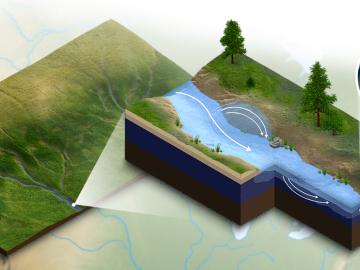
A new modeling capability developed at Oak Ridge National Laboratory incorporates important biogeochemical processes happening in river corridors for a clearer understanding of how water quality will be impacted by climate change, land use and

Oak Ridge National Laboratory, University of Tennessee and University of Central Florida researchers released a new high-performance computing code designed to more efficiently examine power systems and identify electrical grid disruptions, such as

New data hosted through the Atmospheric Radiation Measurement Data Center at Oak Ridge National Laboratory will help improve models that predict climate change effects on the water supply in the Colorado River Basin.
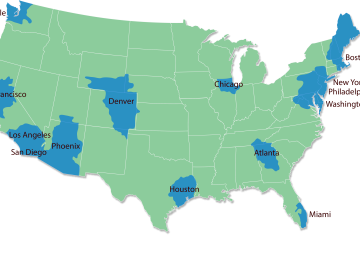
Oak Ridge National Laboratory worked with Colorado State University to simulate how a warming climate may affect U.S. urban hydrological systems.

To minimize potential damage from underground oil and gas leaks, Oak Ridge National Laboratory is co-developing a quantum sensing system to detect pipeline leaks more quickly.

Oak Ridge National Laboratory researchers have developed a new catalyst for converting ethanol into C3+ olefins – the chemical
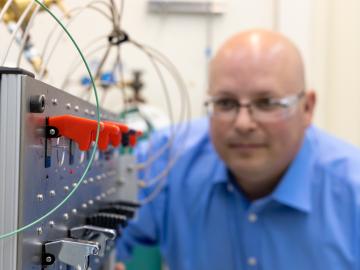
An Oak Ridge National Laboratory researcher has invented a version of an isotope-separating device that can withstand extreme environments, including radiation and chemical solvents.
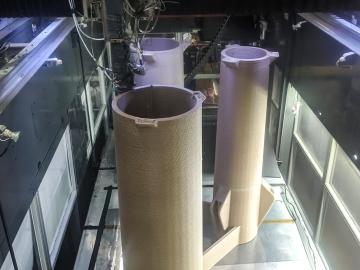
A team of researchers at Oak Ridge National Laboratory demonstrated the ability to additively manufacture power poles from bioderived and recycled materials, which could more quickly restore electricity after natural disasters.
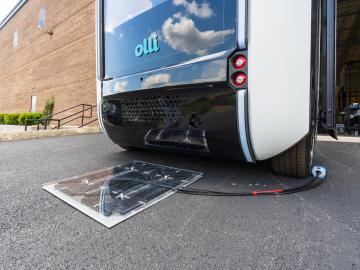
Oak Ridge National Laboratory researchers demonstrated their wireless charging technology on an autonomous electric vehicle for the first time in a project with Local Motors.

Scientists at Oak Ridge National Laboratory have developed a solvent that results in a more environmentally friendly process to recover valuable materials from used lithium-ion batteries, supports a stable domestic supply chain for new batteries


